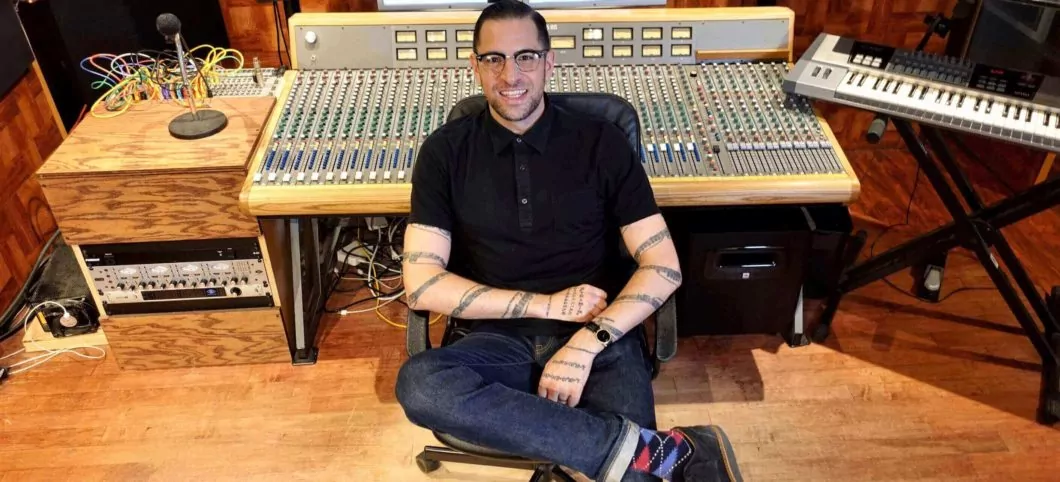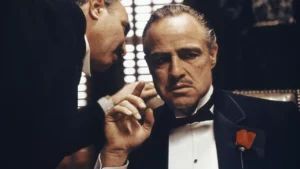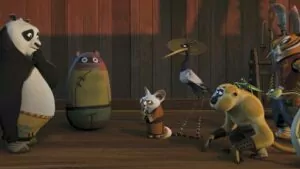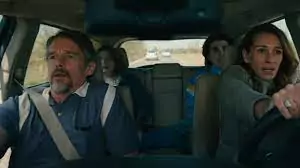
Roman Molino Dunn is an award-winning composer and producer (a.k.a Electropoint) at Mirrortone Studios in New York City. We had a chance to interview him on his work in the film Snakehead.
Q. Hello Roman. I am Ayush Jain from The Movie Culture. How’re you doing today?
Roman Molino Dunn: I am great, I am great. How about you?
Q. Yeah, I’m good. I’m doing fine. So first of all, congratulations on the film, the movie is basically about a woman who is smuggled into New York. And her whole journey through the brothel, and basically her redemption arc. So starting with the obvious question, how did you get involved in this project and tell us about your contribution to the film?
Roman Molino Dunn: Sure, so I got involved with the project pretty late, but that’s normal for the composer, you know, I’m coming in to write the music after they’ve filmed it, edited it, you know, done a considerable amount of work both creatively and technically. And I met the director because I own a recording studio in Manhattan. And we also did the ADR for the film and the sound design for the film. And he had heard some other music that I did for another film on HBO. And we got along really well. And we had a similar aesthetic and opinion about art and film. So we got along really well. My contribution to the movie was writing all of the music.
Q. Yeah, yeah. So the director of the film, Evan, has basically directed many documentaries and many short films, but this was his first feature film. So how was your experience with him, as you said that he helped you, basically, both of your vibes were matching in the sense of the music and all? So how did his experience with the documentaries help or basically aid in the composition of the film?
Roman Molino Dunn: Well, it was actually really helpful that he was a documentary filmmaker, because, well, for two reasons, one, as a filmmaker, aside from the music, he was able to tell really great stories visually. So it wasn’t just about the dialogue, he was able to use place and picture to move the story along in a really wonderful way, as somebody who’s had to do that without having a written script, if you will. So that’s really great when you see that as a composer because it gives you a lot of time to write music to the sequences that don’t have dialogue. And that’s really wonderful. Because if you don’t have dialogue, the music can be a little more active and more melodic, and you’re not going to get in the way. So that was the first part. And then the second part about it is documentary filmmakers often have, depending on what type of documentary, they’ll often have a lot of experience placing in music on their own, because they might be using libraries or pre written music and working with the editor if they’re not editing it themselves. But Evan does a lot of editing himself, too. Yeah. So he was very familiar with, like, maybe where the music should come in how it should leave. He just had more ideas, because of that kind of work as to what he was trying to say musically. And then I was able to just focus on writing that music for him.
Q. So as it is mentioned, you basically composed the whole first 10 minutes, which has no dialogues. And, as you said, that you believe that the music is more like an electronic and orchestral hybrid? What was the main, like, main idea behind that hybrid? And how was it used in the first 10 minutes?
Roman Molino Dunn: Yeah, so I mean, the concept was that we wanted to stay away from it, for the most part. We wanted to stay away from traditional Chinese folk music. So you know, the film’s about Chinatown. Yeah. And I mean, it’s about much more than that. But that’s what the backdrop and that’s what the characters were, you know, their backgrounds were, and we thought it would be a disservice to just focus on that we wanted to do something that was classic and timeless, in the vein of some classic mafia movies like Goodfellas, or the Godfather, something that was romantic and orchestral. But then also, we wanted to keep it modern and dark, because that’s what the visuals were doing. And so that’s where the electronics came from. And it’s not always electronic. Sometimes it’ll be like an orchestra, but with a lot of effects on them to make them, like distorted or gritty. Or sometimes it’s actually a synthesizer playing along with the orchestra. So yeah, the concept came about because we want to keep it romantic and organic. But we also want to have elements of this really kind of dirty, grungy, dark and gritty underworld.
Q. Okay. Right. So as the movie is based in Chinatown in New York, and basically, it is like Chinese culture, but it is integrated into the Western or American culture. And you said that you did not want it to be like more Chinese and all like, basically, what I think you mean to say is it should not have been the stereotypical core to the Chinese culture, right? So, but still, in a way, the movie has to represent the Chinese culture, and how it was integrated into the American culture. So how did you do that with your music? Because I believe that music is a really important component in any film, or any show or anything, which represents a culture in a very intricate way.
Roman Molino Dunn: Yeah, yeah. I mean, so what we did was, actually we by not having the Chinese very stereotypical representations of Chinese music, because that’s really the thing to stay away from the cliches, right? Yeah, things that people have latched on to and other films and other representations of this culture. So we stayed away from that. But in doing that, when it actually does happen in this one scene, there’s a particular scene in Chinatown where there’s a there’s this parade that happens every year in Chinatown. And it’s, it’s shown on screen. In that instance, we actually did use the music that’s typical of that festival,
Q. I believe that is more along the lines of the representation, and that should be put forward to the audience.
Roman Molino Dunn: Yeah, absolutely. And so because we hadn’t been doing that the entire time, it is very featured. And, you know, we showed it with the reverence that it deserved. There’s also once you know, a few scenes that take place in a different country. And when we were there, we changed the music to represent the place in that sense, but Chinatown is a very complex place in New York City. So it would have been difficult anyway, to just use one specific type of music to represent all of the different backgrounds of the individuals who live there. So it was really good that that’s not the music that we ended up using. And I mean, it wasn’t just me, to be honest, I wasn’t like, hey, let’s not do this. Let’s do this. You know, it’s the director who’s telling me what he wants artistically to happen. And it just so happened that the music we went with was not stereotypical or cliché.
Q. Yeah. The movie is about a woman who is an underdog basically, and she is under bad circumstances, but she rises through the ranks to stand on her feet. So how did your score help in representing, not representing but more like portraying her journey and her strength?
Roman Molino Dunn: Yeah, that’s a great question. Um, it was, it was hard to do, obviously, because when you when you’re writing a score, it has to do two things, it has to carry the scene. So if there’s something going on on screen, you want to make sure that the music is helping the viewers feel that, but also, you’re trying to make this entire journey happen musically. And so the way that it was done in this film was actually relatively straightforward is that we had a theme for a musical theme for Chinatown for the place. Okay. And then we had a musical theme for the main character, and we had a musical theme for the protagonist. And then we had a musical theme for the antagonist. And what happens is over the course of the film, our main characters theme starts to integrate into Chinatown’s name. So if you listen to it, in the beginning, Chinatown has this very, very distinct melody and on the soundtrack, it’s called Chinatown. At the very end of the movie, you can hear that there’s an extra melody added to it. And it’s the music that we always heard when we saw the main character on screen. And the implication there is that the main character has now become fully integrated into Chinatown, and is the main figure present in Chinatown. That’s how that works.
Q. So more like when she came to Chinatown, she was her own self. And she did not relate to Chinatown because she was new to that world. But then towards the end of the movie, she could feel that Chinatown is her home.
Roman Molino Dunn: Yeah, exactly.
Q. So did you work on the movie during the COVID? Or before?
Roman Molino Dunn: A little bit of both. So we did most of it was done before COVID. You know, the final scoring had been done. But what happened was we finished like right before COVID Yeah. So yeah, it got into all of these great film festivals and everything. But all of the film festivals got cancelled. And so we had to wait another year to get into the big film festival, Santa Barbara and Toronto Film. Yeah. And what happens is, when you get into some of those bigger film festivals, you get a chance to really look at it one more time. And the part you’re looking at often is the mix. So how does it sound in the theater? So making sure the surround sound is really good. And because we didn’t change it in the music, which was really great. But we did change some of the mix of the music and sound design to make it play better in larger theatres.
Q. Okay. As you said, most of the work was done before COVID. And like a little bit of the process was done after the lockdown happened. And so basically, before the COVID, you worked along with your crew, but during the lockdown, I believe you were alone. So how is that whole process like working alone when compared with a crew and the members
Roman Molino Dunn: Well, it’s not too different for a composer, really? I mean, I’ve done a lot of films during COVID. And the main difference, I would say is that one or two of the meetings are not done in person. I mean, honestly, the way that it’s worked in my career is that I’ll have the first few meetings with the director, and I’ll have the last, the end of the few meetings with the director.
Q. Yeah. When you are done with everything.
Roman Molino Dunn: Yeah, pretty much, or when it’s relatively close, and we just want to have a session together to kind of massage it and review some individual elements. But the middle part where I’m writing, that’s, that’s largely done alone. And that’s, that’s typical for most composers, you know, it’s a lot of me sitting there and working on ideas and fleshing them out. And if somebody is there doing it, it would be very boring for them.
Q. Yeah. Yeah. As a composer, what do you think, well, what is your thought process before embarking on a project? And, or before starting a process of composition?
Roman Molino Dunn: Yeah, so there’s a few things. One is to have that meeting with the director or the producer, if it’s a TV show, and just really understand what they want. And sometimes they don’t know what they want? Or let’s put it this way, they say they don’t know what they want, because they don’t know yet. But as soon as you start showing them things, if they didn’t know what they wanted, they’ll start to know what they didn’t want. And then you kind of do that process of elimination to find what they’d like. If, on the other hand, they know exactly what they want. You have to understand why they want it. Yeah, because sometimes the language doesn’t match up, you know, they’ll say, they want this piece of music because it’s sad, but to you it’s not sad. It’s just maybe it’s, you know, slower, right? And you just need to understand why they’re liking certain pieces of music. And you also need to understand, you know what the movie or film or television show is trying to say, because once you understand the meaning, you do have a little bit of leeway, oftentimes, if the director is open to it, to suggest other directions. You know, that’s part of the collaborative process is to speak up occasionally. But at the end of the day, it’s really you’re just trying to help them find the music that they wanted. So understanding where their head is at is really the part that you take the most time to focus on in the beginning.
Q. Yeah. Right. So you have worked on Paul Schrader’s film, Card Counter, and another film, I believe it’s the HBO one, Huracan. So these are also thrillers in a similar way to Snakehead. But still, these movies are all three of them are very different in terms of the story and the cultural aspect. So how did the story of each of these movies affect the way you make a score for them?
Roman Molino Dunn: So well, with card counter, I didn’t write the music, I was a score producer. So that means that I help record it and mix it that kind of thing. So that one, that I mean, you’re still informed by the story, you know, when you’re working on it, you need to be careful with how you record and mix things. But that one is more of a technical aspect. They hired me because of the experience that I had working on other films, They needed somebody like myself to help record the music in a way that was able to be synced to film. Yeah, to make sure that you record it in a way that’s flexible enough for the music editors. So, yeah, there was a lot of music written by an individual who had more of a rock background. And so when you do stuff like that, a lot of times the production company wants somebody who has experienced writing for film, to be a team player and kind of share some of that experience.
Q. Basically, guide them.
Roman Molino Dunn: Yeah, guide them when they need it, and not guide them when they don’t need it, you know. And then with Huracan on HBO, that one was a little bit different in the sense that as a composer, I was lucky to be brought on in the very beginning, they gave me the script I was I was in that from the very beginning. And I worked very closely with the director going back and forth. And yeah, I mean, the culture was different, you know, the cultural background of the character was different. But because I work so closely with the director, again, it wasn’t really about what I wanted to necessarily bring to it. It was about how do I accomplish what they would like me to bring to it. So I was more focused on understanding what they would like and how I get that to happen. Then I was figuring out my own take on it.
Q. Okay. So along with these three films, you’re also working on or maybe you worked on it already, Sean Baker’s new film, Red Rocket, and it’s a comedy. But in a sense, comedy and thriller are like contrasting to each other. So how does that work when you start composing for a film that is a comedy, and another that’s a thriller?
Roman Molino Dunn: Sure, yeah. Totally different. So the Sean Baker film, I wrote songs, actually. So it was very different, just by virtue of that even. And they’re hip hop songs. They’re this. I don’t want to give too much away, but they’re the songs you’d hear in a strip club. Yeah. So with that, I mean, I have a background also making music for artists, recording artists and pop singers and rappers and all of that. It’s all. You know, a similar thing, when you’re writing music for a director, the director tells you what kind of music they want for a scene when you’re writing music for artists, they tell you what kind of music they want to sync to. And in this sense, I wrote music for a film and a singer. I actually rapped on some of them, because with the wonders of modern technology, even I can sound okay rapping. Yeah, so it was a totally different thing. And that’s one of the wonderful parts about my job is I get to write different music depending on the project.
Q. Yeah. So one more question. You worked on RuPaul drag race all-stars. And that was, I believe for a runway?
Roman Molino Dunn: Yes, yes.
Q. So I’m not really sure about this one. But again, it was for a runway walk, right?
Roman Molino Dunn: Yeah. And this was similar to the sense where I’m writing music for an artist because the artists on that show a lot of you know, artists, drag queens that, yeah, they also have careers, making music and being entertainers general. And so with that, I wrote a song that was on the show, but it’s also the song for the artist. Although it was very tailored to what they’re doing on the show, it’s, you know, the network has to prove it. It’s, it’s like scoring a show in that sense. And it’s very different. But same thing, you know, that in that sense, the artist is the director, except that when you do it for a TV show, as I said, there’s a lot of other layers of approvals and producers telling you that you can do this, you can’t do this. It’s too long. It’s too short. You know, all this stuff that you faced when you’re scoring background music as well.
Q. Okay. Yeah. So finally, have you been working on any new and exciting projects that we should look out for?
Roman Molino Dunn: Yeah, absolutely. So the one I’m, I could talk about the most right now is going to be on Netflix in February. It’s called AI love you. AI as in artificial intelligence. Yeah. And it’s like, I love you. AI Love you. And it’s a Thai film, actually a Thai and Chinese. And it stars some really big actors in Asia. So it’ll have a theatrical run in China, and across a few different countries in Asia. But it’ll also be worldwide on Netflix. And I’m very excited for that one because it is a sci-fi rom-com, which that doesn’t happen a whole lot.
Q. The only sci-fi film that I can think of, which involves, like technology and AI is Her, but it’s not rom-Com.
Roman Molino Dunn: Yeah. Yeah. So I love this. Because, you know, as you said, I do a lot of thrillers, but I also do, you know, like a drag race, or Sean Baker. And so yeah, the Sci-Fi and the comedy part throw in a little bit of romance. And it’s really got everything that I love to work on.
Q. Yeah. So yeah, that’s it. Thank you, Roman. It was nice talking to you. And I hope that we can talk again sometime if any future interviews line up. So, stay safe with the new COVID variant and all going on. Anyway, so thank you.
Roman Molino Dunn: Thank you so much.
The Movie Culture Synopsis
In Snakehead, a woman (Sister Tse – portrayed by Shuya Chang) rises through the ranks of the gang that smuggled her into New York City. The movie is inspired by the real-life Cheng Chui Ping, a.k.a. Sister Ping, who ran one of the largest snakehead operations — gang-led human-smuggling rackets — for nearly 20 years before her arrest, as well as other ripped-from-the-headlines stories of human smuggling and organized crime in NYC’s Chinatown.



